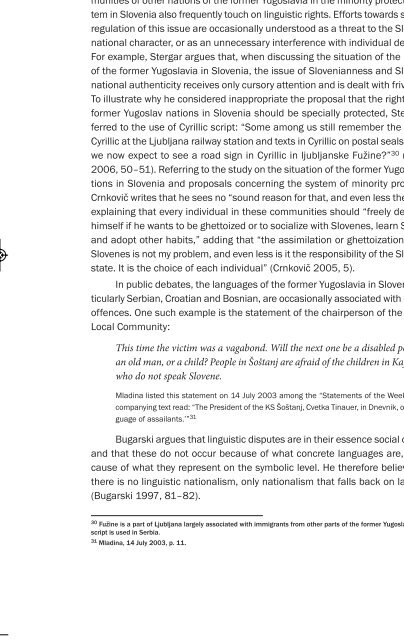The Scars of the Erasure_web
The Scars of the Erasure_web
The Scars of the Erasure_web
- No tags were found...
Create successful ePaper yourself
Turn your PDF publications into a flip-book with our unique Google optimized e-Paper software.
<strong>Erasure</strong>_4a 10.1.11 20:29 Page 237THE ERASED LANGUAGE237interpreted as a continuation <strong>of</strong> Article 61. In his opinion, <strong>the</strong> provision in Article62 refers to an exception, when free use <strong>of</strong> one’s own language (protected by Article61) is not allowed, i.e. in procedures before state and o<strong>the</strong>r authorities.Debates on <strong>the</strong> recognition <strong>of</strong> minority status and <strong>the</strong> inclusion <strong>of</strong> <strong>the</strong> communities<strong>of</strong> o<strong>the</strong>r nations <strong>of</strong> <strong>the</strong> former Yugoslavia in <strong>the</strong> minority protection systemin Slovenia also frequently touch on linguistic rights. Efforts towards systemicregulation <strong>of</strong> this issue are occasionally understood as a threat to <strong>the</strong> Sloveniannational character, or as an unnecessary interference with individual decisions.For example, Stergar argues that, when discussing <strong>the</strong> situation <strong>of</strong> <strong>the</strong> peoples<strong>of</strong> <strong>the</strong> former Yugoslavia in Slovenia, <strong>the</strong> issue <strong>of</strong> Slovenianness and Sloveniannational au<strong>the</strong>nticity receives only cursory attention and is dealt with frivolously.To illustrate why he considered inappropriate <strong>the</strong> proposal that <strong>the</strong> rights <strong>of</strong> <strong>the</strong>former Yugoslav nations in Slovenia should be specially protected, Stergar referredto <strong>the</strong> use <strong>of</strong> Cyrillic script: “Some among us still remember <strong>the</strong> signs inCyrillic at <strong>the</strong> Ljubljana railway station and texts in Cyrillic on postal seals; shouldwe now expect to see a road sign in Cyrillic in ljubljanske Fužine?” 30 (Stergar2006, 50–51). Referring to <strong>the</strong> study on <strong>the</strong> situation <strong>of</strong> <strong>the</strong> former Yugoslav nationsin Slovenia and proposals concerning <strong>the</strong> system <strong>of</strong> minority protection,Crnkovič writes that he sees no “sound reason for that, and even less <strong>the</strong> need,”explaining that every individual in <strong>the</strong>se communities should “freely decide forhimself if he wants to be ghettoized or to socialize with Slovenes, learn Slovene,and adopt o<strong>the</strong>r habits,” adding that “<strong>the</strong> assimilation or ghettoization <strong>of</strong> non-Slovenes is not my problem, and even less is it <strong>the</strong> responsibility <strong>of</strong> <strong>the</strong> Slovenianstate. It is <strong>the</strong> choice <strong>of</strong> each individual” (Crnkovič 2005, 5).In public debates, <strong>the</strong> languages <strong>of</strong> <strong>the</strong> former Yugoslavia in Slovenia, particularlySerbian, Croatian and Bosnian, are occasionally associated with criminal<strong>of</strong>fences. One such example is <strong>the</strong> statement <strong>of</strong> <strong>the</strong> chairperson <strong>of</strong> <strong>the</strong> ŠoštanjLocal Community:This time <strong>the</strong> victim was a vagabond. Will <strong>the</strong> next one be a disabled person, oran old man, or a child? People in Šoštanj are afraid <strong>of</strong> <strong>the</strong> children in Kajuh Parkwho do not speak Slovene.Mladina listed this statement on 14 July 2003 among <strong>the</strong> “Statements <strong>of</strong> <strong>the</strong> Week;” <strong>the</strong> accompanyingtext read: “<strong>The</strong> President <strong>of</strong> <strong>the</strong> KS Šoštanj, Cvetka Tinauer, in Dnevnik, on <strong>the</strong> ‘language<strong>of</strong> assailants.’” 31Bugarski argues that linguistic disputes are in <strong>the</strong>ir essence social conflictsand that <strong>the</strong>se do not occur because <strong>of</strong> what concrete languages are, but because<strong>of</strong> what <strong>the</strong>y represent on <strong>the</strong> symbolic level. He <strong>the</strong>refore believes that<strong>the</strong>re is no linguistic nationalism, only nationalism that falls back on language(Bugarski 1997, 81–82).30 Fužine is a part <strong>of</strong> Ljubljana largely associated with immigrants from o<strong>the</strong>r parts <strong>of</strong> <strong>the</strong> former Yugoslavia. Cyrillicscript is used in Serbia.31 Mladina, 14 July 2003, p. 11.


